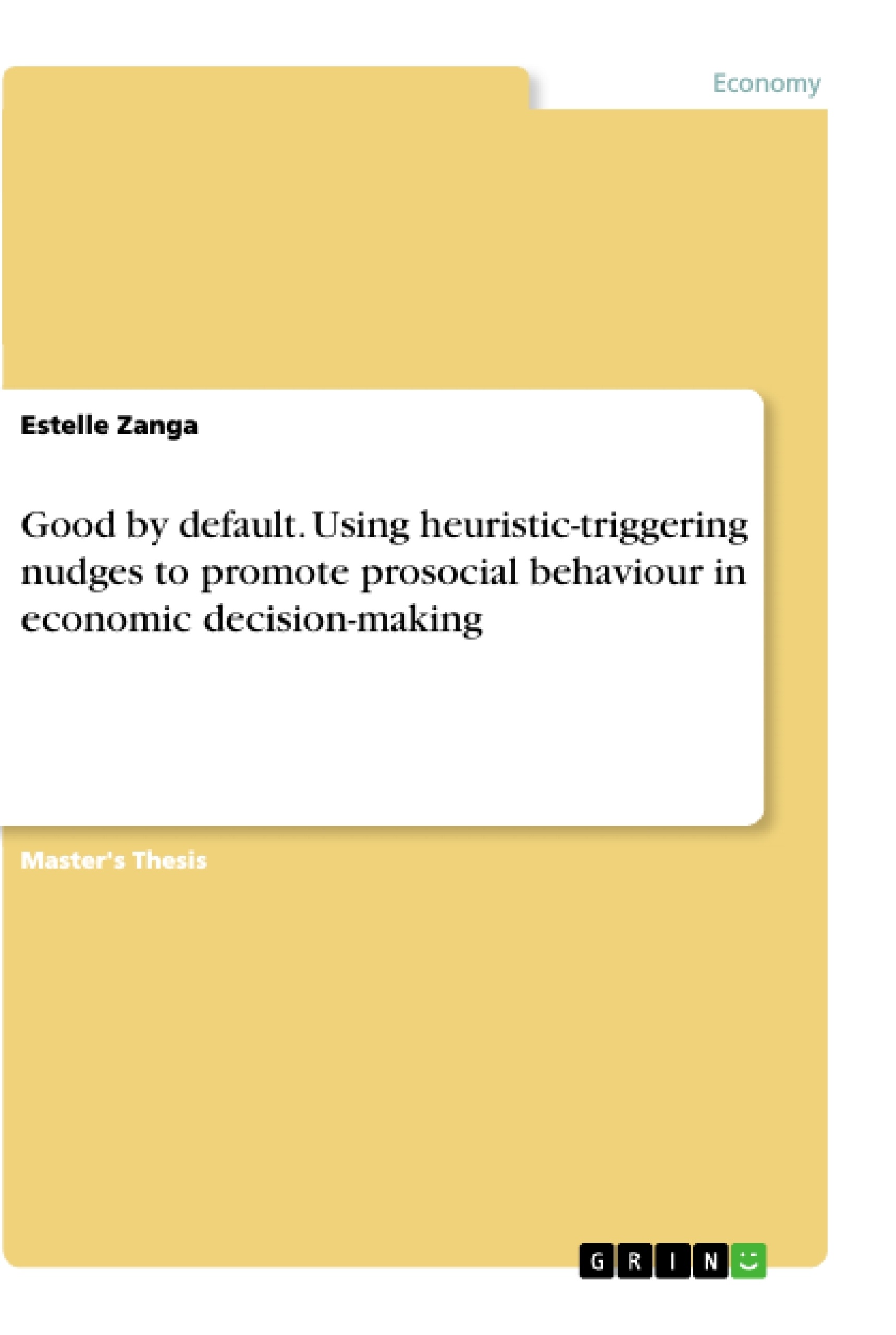Humans are generally perceived as intuitively selfish, particularly in their economic decision-making. Under the Dual-Process Framework (DPF), this view entails that prosocial behaviour requires reflective control over those natural inclinations towards self-interest. However, new lines of research explore the heuristic basis of prosocial actions and their potential use for policy-making. The goal of this thesis is to enquire into intuitive mechanisms which foster prosocial behaviour in economic decision-making and how to use them to promote altruism and cooperation through heuristic-triggering (“pure”) nudges. We found that while in some contexts prosocial choices can be economically rational, heuristic mechanisms also drive them and for some individuals, they do so to a higher extend than deliberative processes. Our literature review identified three main classes of heuristics that significantly drive prosocial behaviour: kin recognition, social and affect heuristics. Based on Intuitive Design principles, we developed a toolkit for heuristic-triggering nudges enabling choice architects to structure and describe choice options, as well as to address implementation issues, with the goal to make prosocial actions the most attractive alternative. One interesting highlight of our analysis is the differentiation of three master frames for evaluating prosocial nudges: increase in prosocial actions, ex-post satisfaction of decision-maker and social welfare outcome. Finally, we derived practical implications of our findings in social and environmental policy interventions.
Inhaltsverzeichnis (Table of Contents)
- Setting the Stage
- Introduction
- Relevant Definitions
- Theoretical Framework
- Decision-making under uncertainty
- Rational Choice Theory
- Bounded Rationality
- Dual-process Theory
- Heuristics and Decision Biases
- Prosocial Behaviour
- Social preferences
- Altruism
- Cooperation
- Behavioural Economics and Policy Making
- Incentives
- Nudge Theory
- Research Question and Methodology
- Research Question
- Formulation of Research Question
- Hypotheses
- Relevance of the topic
- Methodology
- Results
- Link Between Prosocial Behaviour and Heuristics
- Economic Rationality of Prosocial Behaviour
- Heuristics Mechanisms Underlying Prosocial Behaviour
- Use of heuristics to nudge prosocial behaviour
- Structuring the choice
- Describing the choice options
- Addressing implementation issues
- Conclusion
- Key Findings
- Organizational and practical implications
- Discussion and future research
Zielsetzung und Themenschwerpunkte (Objectives and Key Themes)
This thesis investigates intuitive mechanisms that promote prosocial behavior in economic decision-making, aiming to understand how heuristic-triggering "pure" nudges can be used to encourage altruism and cooperation. The work explores the economic rationality of prosocial choices, examines how heuristics drive these choices, and identifies three key classes of heuristics that influence prosocial behavior: kin recognition, social and affect heuristics.
- The role of heuristics in driving prosocial behavior
- The potential for using heuristic-triggering nudges to promote prosocial actions
- Developing a toolkit for designing heuristic-triggering nudges
- The application of findings to social and environmental policy interventions
- Different framing perspectives for evaluating prosocial nudges
Zusammenfassung der Kapitel (Chapter Summaries)
- Setting the Stage: Introduces the topic of prosocial behavior in economic decision-making and defines relevant concepts.
- Theoretical Framework: Discusses decision-making models under uncertainty, including rational choice theory, bounded rationality, dual-process theory, and heuristics and decision biases. It also explores the nature of prosocial behavior, specifically social preferences, altruism, and cooperation.
- Research Question and Methodology: Formulates the research question and hypotheses, emphasizing the relevance of the topic and outlining the methodology used for the study.
- Results: Examines the relationship between prosocial behavior and heuristics, considering the economic rationality of prosocial actions and the heuristic mechanisms underlying them. It then explores how heuristics can be used to nudge prosocial behavior, including structuring the choice, describing choice options, and addressing implementation issues.
Schlüsselwörter (Keywords)
The core themes of this thesis are economic decision-making, heuristics, social preferences, prosocial behavior, altruism, cooperation, nudges, and behavioral economics. The work investigates how heuristic-triggering nudges can be used to promote prosocial behavior, specifically altruism and cooperation, in economic decision-making contexts.
- Quote paper
- Estelle Zanga (Author), 2017, Good by default. Using heuristic-triggering nudges to promote prosocial behaviour in economic decision-making, Munich, GRIN Verlag, https://www.grin.com/document/536440




